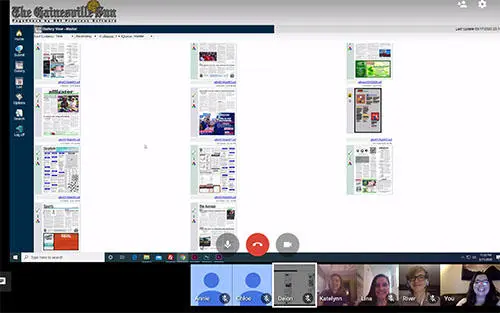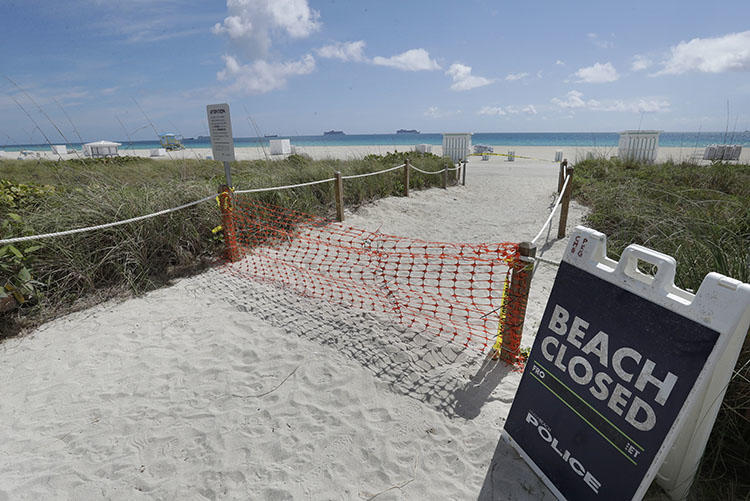When university campuses across the U.S. began to send students home in response to growing coronavirus concerns, student journalists did not close their student papers, pack up, and leave. Instead, many student journalists across the country have emerged as their communities’ local coronavirus news reporters. The student journalists at The Independent Florida Alligator at the University of Florida in Gainesville have been on the frontlines of coronavirus reporting. For Christina Morales, editor-in-chief of The Alligator and a senior journalism major, the pandemic has presented challenges well beyond the scope of her regular responsibilities.
The Alligator is one of the largest independently owned student newspapers in the country and only recently began receiving some funding from the university. With the school year upended and the University of Florida campus shut down to all but essential workers, the responsibilities of outlining the paper’s editorial and operational strategies during the pandemic now rest on Morales’ shoulders.
Morales told CPJ that though covering the pandemic has presented students with an unmatched opportunity to cover history, it also poses serious challenges to student journalists, including physical and psychological safety concerns, tightened budgets, and a lack of transparency from local and university officials. With only the help of her team, Morales has had to outline a safety protocol for the paper’s reporters, move the newsroom online, and run the paper on shrunken advertising revenue — all while keeping the paper printing, now on a reduced schedule of once per week.
CPJ interviewed Morales by phone in early April 2020. Her responses have been lightly edited for length and clarity.
How has the pandemic affected your work on a daily basis? Is the Alligator still providing its usual coverage?
We’re producing more than we used to and most of our content is COVID-19-related in some way. Our staff has also all moved to working remotely and no one is reporting in the field except for photographers. We’re updating a story or producing new content at least four to five times a day, even though the number of print issues that we’re doing has gone down to once a week.
Something that I’m already thinking about is, in three to six months from now, will all of our stories still be on COVID-19? And when this all becomes normal, what is there left to write?

Tell us more about the challenges of doing your job in this environment. What are your greatest obstacles and concerns?
I think this goes for anyone reporting on COVID-19 right now, but the question we’re asking is, how many COVID-19 stories can you take? How much can you bear to read or report or edit? It takes a toll on you, especially when you see the devastation behind it.
I’m also concerned about the long term effects this is going to have on our revenue. We were projected to make a slight profit this year and that would have been huge for us. It wasn’t much, but that was a victory. Now we’re thinking about how much we’re going to have to cut back in order to save money. It feels like the weight of the revenue and the result of that decision making rests heavily on my shoulders.
The last thing is that printing a paper remotely is just the hardest thing. It’s hard enough to do it in person anyway. It has become the most tedious process and it’s really frustrating.
What are you doing to keep yourself and the newsroom safe? What information do you use to make decisions about safety?
In mid-March we noticed that the number of coronavirus cases was starting to take a turn so I knew we had to start thinking about what we were going to do if there was a pandemic. I asked staff who had recently travelled, been sick, or been around somebody showing symptoms to work remotely. Then we saw the severity go from zero to one hundred in three days and I told reporters not to go out on assignment at all and we transitioned to being completely remote.
A lot of these decisions I made on my own. I was following CDC guidelines and guidelines from the state on how many people could gather. I think that any student newspaper could tell you that that’s what they did too — I don’t think anybody really had any guidance on what works best in this situation. Now I wonder, was I too severe in not having any reporters go out into the field that early? Maybe, but I’m glad I did it because, to my knowledge, nobody on staff has gotten sick.
How are you able to care for your mental health and the mental health of other student reporters during this time?
Just now I signed up for a mental health student talk and I sent the link to my staff saying, “No shame, I’m going to this, and it’s okay not to be okay.” The staff is still working but I know that a lot of them are suffering from the same feelings — all the anxieties that come with this, and not being able to talk to anybody, and all the general stress that comes with reporting and reading coronavirus news all day.
I can only really do three things. One, I check in with the staff every once in a while and I say, “Hey, you guys are doing great. But also, how are you feeling? How are your staff writers feeling? Do they need a break?” I also try to evaluate who needs to step back and who doesn’t and then shift the load. Just now I was getting ready to send a message to the staff about mental health resources. And I’m trying to host a virtual meeting where I can just see the staff and talk to them and just hang out. We used to be able to see each other every week, and now that we’re remote it’s impossible to know how everyone’s doing.
Do you find that there is misinformation about the virus in the student community? How are you responding to it?
We, like a lot of other places, received a lot of criticism at the beginning that we were over-hyping the problem. For example, internal emails were leaked to us about classes going online that we were able to independently confirm so we published about online classes before the university broke that news. People told us we were over-hyping it and that this was “fake news” because they hadn’t seen the emails. That’s been quite a battle and I’ve had to step in and say that this is just us reporting the facts. Another issue that we’ve had is that people will send us “tips” when they’re really just rumors that they’ve heard.
Has the recent implementation of a stay in place order in Florida changed your job at all? Are student journalists considered “essential workers” under the order?
An Alachua county stay at home order was implemented about a week or two before the state’s order, but it hasn’t had much of an effect on our paper because at that point we had stopped all field reporting and had begun working remotely. For our photographers who are still going out into the field, they’re considered essential workers because they’re members of the press, so they’re still able to do the things they need to.
How would you rate Florida and university authorities’ openness and accessibility for student journalists covering the crisis?
The university and the county have both been very helpful in getting us information in a timely manner. However, the county health department and the Florida Department of Health have often had conflicting numbers of cases and hospitalizations. The county also often cites HIPAA when, in my opinion, HIPAA doesn’t really apply. If we want to know how many people in our county were tested, we’re told they can’t give that information out because of HIPAA. And I explain that I’m pretty sure that it’s not a HIPAA violation, but we’re still told that they can’t give those numbers to us.
The university is a different story. The spokesperson has been very helpful in responding to our questions and getting back to us in a timely manner. However, when cases in the county began to climb and we began to see the ages of some of them as 21 and 24 — pretty normal college age — we started asking the university if they had any known cases of COVID-19. For days they said they didn’t know anything. Yet, we were receiving tips that the university knew about cases. Then our governor announced that the university had four cases of COVID-19 and that’s when the university scrambled to communicate. We had asked about the cases for days. Why couldn’t that be said to students earlier?
CPJ’s safety advisory for journalists covering the coronavirus outbreak is available in English and nearly 30 other languages. Additional CPJ coverage of the coronavirus can be found here.
